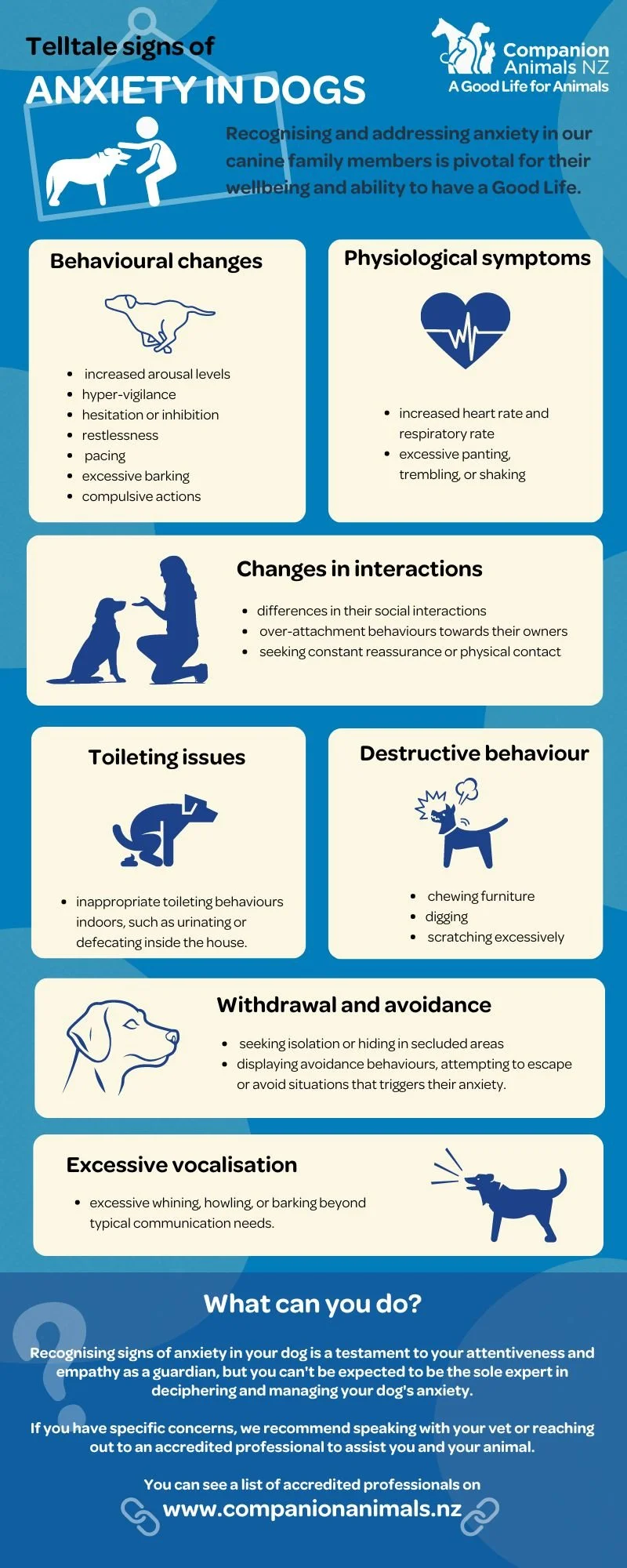Dog Anxiety Awareness Week takes place from 6-12 May this year. This is a great time to shed light on the multifaceted aspects of canine anxiety; a common emotional state among dogs which requires attentive care and support.
In the realm of pet behaviour, the terms "anxiety" and "fear" often overlap, yet they carry distinct meanings crucial for accurate diagnosis and treatment. Anxiety, unlike fear, stems from an anticipatory sense of threat, triggered by contextual cues rather than immediate danger.
Recognising and addressing anxiety in our furry family members is pivotal for their wellbeing and ability to have a Good Life.
What can cause anxiety? It’s important to get to the root cause of the anxiety in order to address it. For example, it could be related to being separated from the owner – where the root cause is likely to be ‘over-attachment’ - this is something that has been reported to be common in dogs that have been rehomed repeatedly. Alternatively, it could be triggered by specific events like fireworks, initially causing fear but evolving into anxiety due to the inability to locate or control the source.
Having an understanding of the reason for the anxious response goes a long way to helping to resolve it and improve dogs’ quality of life.
What are the tell-tale signs of anxiety in dogs?
Anxious dogs and cats exhibit a spectrum of behaviours signalling their distress.
Behavioural changes: Dogs experiencing anxiety may exhibit alterations in their behaviour patterns. This can include increased arousal levels, hyper-vigilance, hesitation or inhibition in completing tasks, restlessness, and heightened locomotor activity (moving the body through space from one location to another). Additionally, they may display behaviours such as pacing, excessive barking, or compulsive actions.
Physiological symptoms: Anxiety often manifests in physiological responses in dogs, including increased heart rate and respiratory rate. Excessive panting, trembling, or shaking are common physiological signs observed during anxious episodes.
Changes in interaction: Anxious dogs may demonstrate differences in their social interactions. They might display over-attachment behaviours towards their owners, seeking constant reassurance or physical contact, especially during stressful situations.
Toileting issues: In cases of separation anxiety or heightened distress, dogs may exhibit inappropriate toileting behaviours indoors, such as urinating or defecating inside the house. This can serve as a visible indicator of their emotional state.
Destructive behavior: Anxiety can lead to destructive behaviours in dogs, such as chewing furniture, digging, or scratching excessively. These actions often occur as a coping mechanism or outlet for their heightened emotional arousal.
Withdrawal and Avoidance: Some anxious dogs may exhibit withdrawal behaviours, seeking isolation or hiding in secluded areas. They might also display avoidance behaviours, attempting to escape or avoid situations that trigger their anxiety.
Excessive vocalisation: Anxious dogs may vocalise excessively, manifesting as whining, howling, or barking beyond typical communication needs. This vocalisation can serve as an expression of their distress or an attempt to seek attention or relief.
What to do if you think your dog has anxiety?
To all the pet owners who find themselves navigating the complex world of canine anxiety, we commend you for your unwavering dedication to your companion animal’s welfare. Recognising the signs of anxiety in your dog is a testament to your attentiveness and empathy as a guardian.
It's essential to acknowledge that while your love and concern are invaluable, you can't be expected to be the sole expert in deciphering and managing your dog's anxiety. Treating anxiety-related behaviours requires a nuanced understanding of their underlying triggers. Seeking help from trained professionals is a proactive step towards ensuring the best possible care for your beloved pet.
Veterinarians and Certified Animal Behaviorists play a pivotal role in diagnosing, treating, and managing anxiety-related concerns in pets. Their guidance, alongside tailored treatment plans, empowers pet owners to address behavioural challenges effectively. Once diagnosed with the help of a trained professional, a comprehensive approach involving medication and physical activity proves most effective in managing canine anxiety, as untreated anxiety can have long-lasting mental and physical health complications.
What might an expert address?
Depending on the root cause of anxiety, there are various strategies that can be used to help your animal’s specific needs:
Behaviour modification techniques: Implementing behaviour modification techniques based on positive reinforcement can help dogs learn to cope with anxiety triggers. Desensitization and counter-conditioning techniques gradually expose the dog to anxiety-inducing stimuli in a controlled manner while pairing them with positive experiences, such as treats or play, to change their emotional response.
Environmental enrichment: Enriching the dog's environment with toys, puzzles, and interactive activities can provide mental stimulation and alleviate boredom, which can contribute to anxiety. Additionally, creating safe spaces, such as cozy dens or quiet retreats, where the dog can retreat during stressful situations can help them feel more secure.
Regular exercise and mental stimulation: Engaging in regular physical exercise and mental stimulation through activities like walks, play sessions, and training exercises can help reduce anxiety by promoting relaxation and releasing endorphins, which are natural stress-relievers.
Consistent routine: Establishing a consistent daily routine for feeding, exercise, playtime, and rest can provide dogs with a sense of predictability and security, reducing anxiety related to uncertainty or change.
Nutritional support: Some dietary supplements and specially formulated foods contain ingredients that may help support canine mental health and reduce anxiety. Consultation with a veterinarian can help identify appropriate dietary interventions for anxiety management.
Medication: In severe cases of anxiety or when other interventions are insufficient, prescription medications may be necessary to manage symptoms. Medications can help alleviate anxiety and improve the dog's overall wellbeing. However, medication should always be used under the guidance of a veterinarian and as part of a comprehensive treatment plan.
If you have specific concerns, we recommend speaking with your vet or reaching out to an accredited professional to assist you and your animal. You can see a list of Companion Animal New Zealand’s accredited professionals here.




